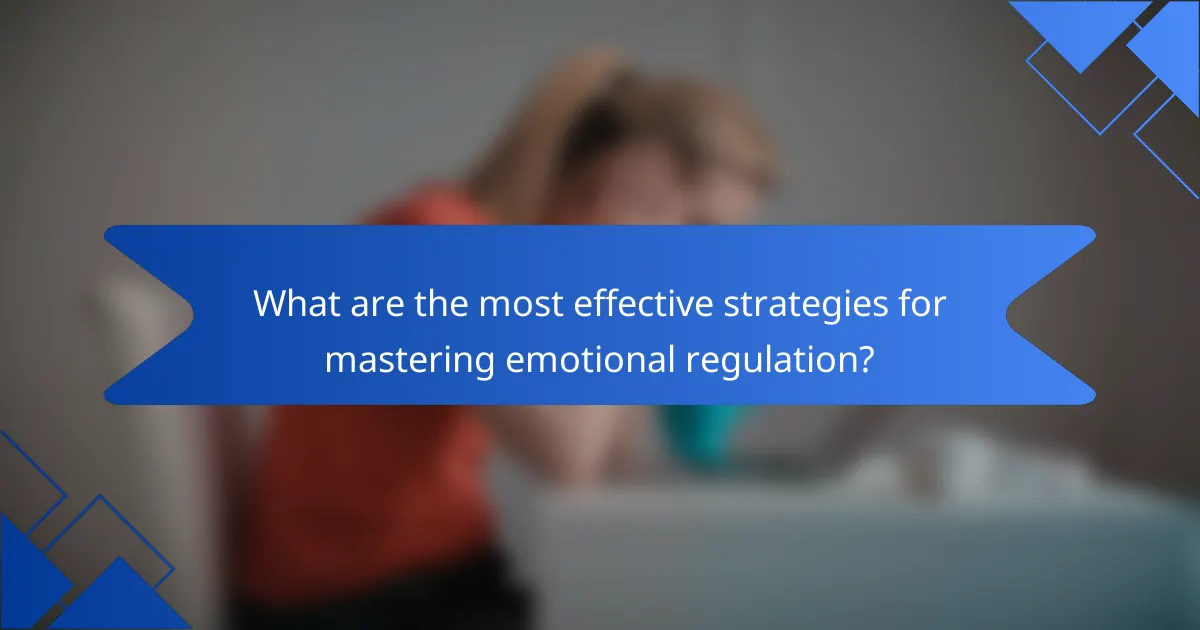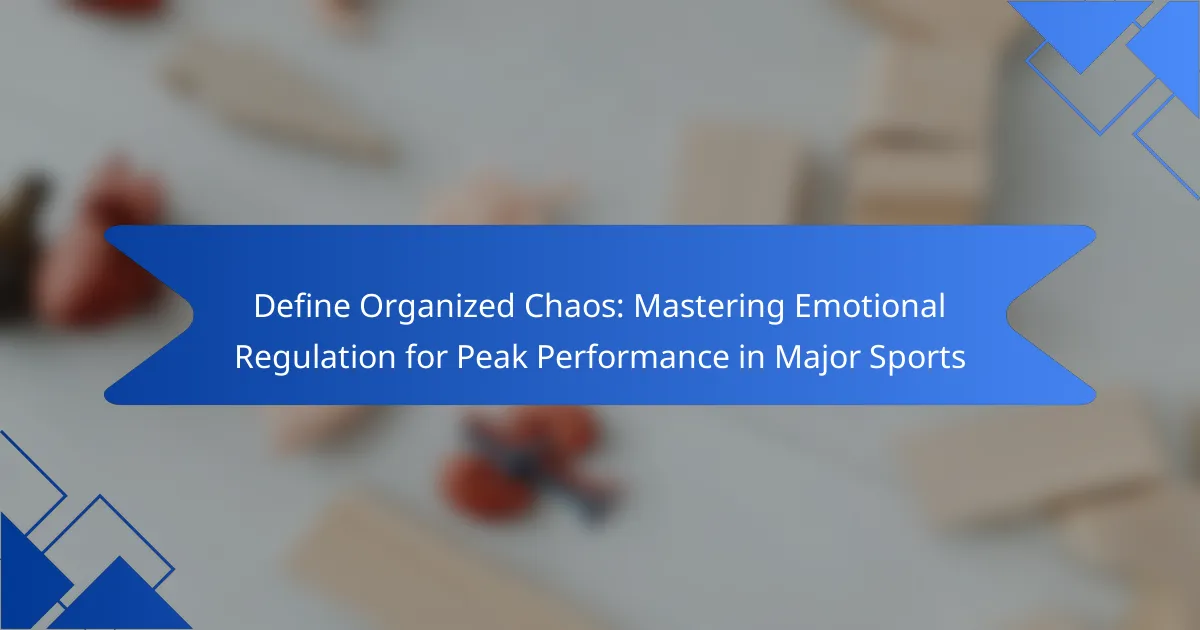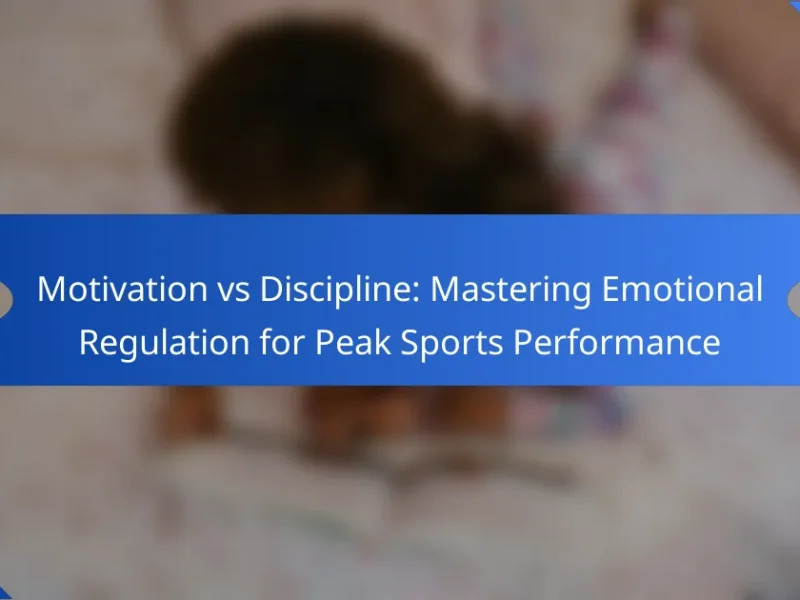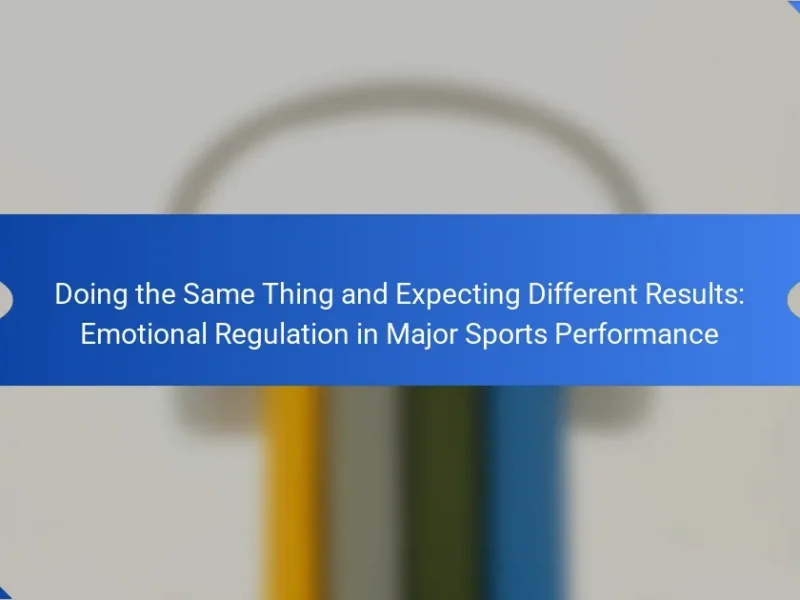Mastering emotional regulation is crucial for athletes seeking peak performance in major sports. Organized chaos involves harnessing emotional fluctuations to enhance focus and adaptability. Key attributes include awareness, control, flexibility, and resilience. Effective strategies such as mindfulness techniques and controlled breathing can help athletes manage stress and improve decision-making during high-pressure situations.

What is Organized Chaos in Emotional Regulation?
Organized chaos in emotional regulation refers to the ability to harness emotional fluctuations for optimal performance in sports. This approach allows athletes to maintain focus and adaptability while navigating high-pressure situations. By embracing emotional variability, athletes can enhance their resilience and decision-making, ultimately leading to peak performance. Studies show that athletes who effectively manage their emotions can improve their overall game strategy and execution.
How does it impact athlete performance?
Emotional regulation significantly enhances athlete performance by improving focus, resilience, and decision-making. Mastering emotional responses allows athletes to maintain composure under pressure, leading to better execution of skills. Research indicates that athletes who effectively manage their emotions experience reduced anxiety and increased confidence, directly influencing their performance outcomes. For instance, studies show that emotional regulation techniques can enhance an athlete’s ability to recover from setbacks during competitions.
What are the psychological foundations of emotional regulation?
The psychological foundations of emotional regulation include awareness, understanding, and management of emotions. These elements enable athletes to maintain focus and performance under pressure. Effective emotional regulation enhances resilience, promotes motivation, and fosters a supportive team environment. Techniques such as mindfulness and cognitive restructuring are vital for mastering emotional regulation in sports.
What role does stress play in sports performance?
Stress significantly impacts sports performance by influencing emotional regulation and decision-making. High stress can lead to anxiety, impairing focus and physical execution. Conversely, optimal stress levels can enhance motivation and alertness, contributing to peak performance. Athletes who master emotional regulation can harness stress as a tool, improving resilience and adaptability in competitive environments. This unique ability differentiates high-performing athletes, enabling them to thrive under pressure.
How do emotions influence decision-making in high-pressure situations?
Emotions significantly impact decision-making in high-pressure situations by influencing focus, judgment, and response. Athletes who master emotional regulation can maintain peak performance despite stress. Emotional awareness helps in assessing risks and making strategic choices. Techniques like mindfulness and visualization enhance emotional control, leading to better outcomes in critical moments.

What are the universal attributes of emotional regulation systems?
Emotional regulation systems universally share attributes like awareness, control, flexibility, and adaptability. These systems enable athletes to manage emotions effectively, enhancing performance. Awareness involves recognizing emotional states, while control refers to the ability to influence these states. Flexibility allows for adjustments in emotional responses, and adaptability ensures responsiveness to changing situations. Mastering these attributes leads to improved decision-making and resilience in high-pressure sports environments.
How do athletes generally manage their emotions?
Athletes generally manage their emotions through techniques like mindfulness, visualization, and cognitive restructuring. These methods help regulate stress and enhance focus during competitions. Mindfulness fosters present-moment awareness, while visualization prepares athletes mentally for performance scenarios. Cognitive restructuring shifts negative thoughts to positive ones, promoting resilience. Together, these strategies create an organized approach to emotional regulation, essential for peak performance in major sports.
What techniques are commonly used for emotional regulation?
Common techniques for emotional regulation include mindfulness practices, cognitive restructuring, and relaxation techniques. Mindfulness enhances awareness of emotions, cognitive restructuring helps reframe negative thoughts, and relaxation techniques reduce physiological stress responses. These methods promote peak performance in major sports by improving focus and emotional stability.
What are breathing techniques for emotional control?
Breathing techniques for emotional control include deep diaphragmatic breathing, box breathing, and 4-7-8 breathing. These methods enhance focus, reduce anxiety, and promote calmness. Practicing these techniques can lead to improved emotional regulation, essential for peak performance in sports.
How does visualization aid in emotional regulation?
Visualization significantly enhances emotional regulation by providing athletes with mental strategies to manage stress and anxiety. It allows individuals to create mental imagery of successful performances, which can lead to increased confidence and improved focus. This technique helps in recognizing emotional triggers and developing coping mechanisms. As a result, athletes can maintain composure and peak performance during high-pressure situations.

What unique attributes distinguish emotional regulation in major sports?
Unique attributes that distinguish emotional regulation in major sports include adaptability, focus under pressure, resilience, and self-awareness. These attributes enable athletes to manage their emotions effectively, enhancing performance. Adaptability allows athletes to respond to dynamic game situations. Focus under pressure helps maintain concentration amid distractions. Resilience fosters recovery from setbacks, while self-awareness aids in recognizing emotional triggers. Collectively, these attributes contribute to peak performance in competitive environments.
How do team dynamics affect emotional regulation?
Team dynamics significantly influence emotional regulation by fostering a supportive environment. Positive interactions enhance emotional resilience, leading to improved focus and performance. Conversely, negative dynamics can trigger stress, hindering emotional control. Effective communication and trust among team members are unique attributes that facilitate emotional regulation, promoting peak performance in major sports.
What role does coaching play in emotional management?
Coaching plays a crucial role in emotional management by providing athletes with strategies to regulate their emotions effectively. Coaches help athletes recognize emotional triggers and develop coping mechanisms, enhancing performance under pressure. This guidance fosters resilience, enabling athletes to maintain focus and composure during competitions. Additionally, effective coaching cultivates a supportive environment, which is essential for emotional well-being and peak performance in major sports.
How do different coaching styles impact athlete emotional states?
Different coaching styles significantly influence athlete emotional states by shaping their motivation and stress levels. For instance, authoritative coaching fosters confidence and resilience, while a more permissive style may lead to anxiety and uncertainty. Research indicates that structured feedback enhances emotional stability, promoting peak performance. Coaches who adapt their style to individual athlete needs can better regulate emotions, leading to improved outcomes in major sports.
What are the specific emotional challenges in various sports?
Athletes face specific emotional challenges in various sports, impacting their performance and mental health. In team sports, pressure to perform collectively can create anxiety and fear of failure. Individual sports often lead to isolation, resulting in heightened stress and self-doubt. Combat sports introduce unique emotional turbulence due to direct confrontation and the potential for injury. Endurance sports can evoke feelings of fatigue and mental exhaustion, impacting motivation. Understanding these emotional challenges is crucial for developing effective emotional regulation strategies.

What rare attributes are associated with elite emotional regulation systems?
Elite emotional regulation systems exhibit rare attributes such as adaptive flexibility, which allows athletes to adjust their emotional responses in real time. Another rare attribute is emotional granularity, enabling precise identification of feelings, leading to better decision-making during high-pressure situations. Additionally, resilience in emotional regulation is crucial, allowing athletes to recover quickly from setbacks. These attributes collectively enhance performance by fostering a state of organized chaos, where emotions are harnessed rather than suppressed.
What are the uncommon practices used by top athletes?
Top athletes often employ uncommon practices to master emotional regulation, enhancing their performance. Techniques include visualization, mindfulness, and controlled breathing, which help athletes manage stress and maintain focus during competition.
Visualization allows athletes to mentally rehearse their performance, reinforcing confidence and reducing anxiety. Mindfulness practices, such as meditation, improve self-awareness and emotional control, leading to better decision-making under pressure. Controlled breathing techniques regulate physiological responses, promoting calmness and clarity in high-stakes situations.
These practices contribute to organized chaos, enabling athletes to thrive in unpredictable environments while maintaining peak performance.
How does cultural background influence emotional regulation in sports?
Cultural background significantly influences emotional regulation in sports by shaping athletes’ responses to stress and competition. Different cultures emphasize various emotional expressions and coping mechanisms, affecting performance. For instance, collectivist cultures may promote group harmony, leading to more restrained emotional displays, while individualistic cultures may encourage personal expression, impacting how athletes manage pressure. Understanding these cultural nuances can enhance coaching strategies and team dynamics, ultimately improving peak performance.

What are the most effective strategies for mastering emotional regulation?
Effective strategies for mastering emotional regulation in sports include mindfulness techniques, cognitive reframing, and controlled breathing exercises. These methods help athletes manage stress and maintain focus during competition. Mindfulness enhances awareness of emotions, allowing for better control. Cognitive reframing shifts negative thoughts to positive ones, fostering resilience. Controlled breathing reduces anxiety, promoting calmness and clarity. Implementing these strategies consistently leads to improved performance and emotional stability in high-pressure situations.
What best practices can athletes adopt for peak performance?
Athletes can adopt emotional regulation techniques to enhance peak performance. These techniques include mindfulness practices, cognitive restructuring, and controlled breathing exercises. Mindfulness helps athletes stay present, reducing anxiety. Cognitive restructuring allows them to reframe negative thoughts, fostering a positive mindset. Controlled breathing regulates physiological responses, promoting calmness and focus. By integrating these practices, athletes can manage stress, improve concentration, and optimize their performance in high-pressure situations.
What common mistakes should athletes avoid in emotional management?
Athletes should avoid common mistakes in emotional management to enhance their performance. Key errors include suppressing emotions, which can lead to increased stress; neglecting self-awareness, hindering effective coping strategies; relying solely on external validation, which can create dependency; and failing to establish a routine for emotional regulation, reducing consistency in performance. Additionally, overlooking the importance of mental recovery can result in burnout. Recognizing and addressing these pitfalls is crucial for mastering emotional regulation in major sports.
How can technology enhance emotional regulation in sports?
Technology enhances emotional regulation in sports through real-time data analytics, wearable devices, and virtual reality training. These tools provide athletes with immediate feedback, enabling them to identify triggers and manage stress effectively. For example, wearables monitor physiological responses, allowing athletes to adjust their mental state during competition. Virtual reality simulations create controlled environments for practicing emotional responses, fostering resilience. This integration of technology supports peak performance by promoting self-awareness and emotional control.
What insights do sports psychologists offer on emotional regulation?
Sports psychologists emphasize that emotional regulation is crucial for athletes to achieve peak performance. They provide strategies to manage emotions effectively, enhancing focus and resilience under pressure. Techniques such as mindfulness, cognitive restructuring, and visualization help athletes navigate stress and maintain composure. By mastering these skills, athletes can transform chaotic emotions into organized responses, fostering a competitive edge.


